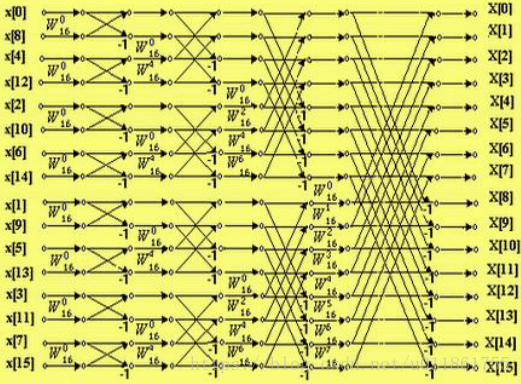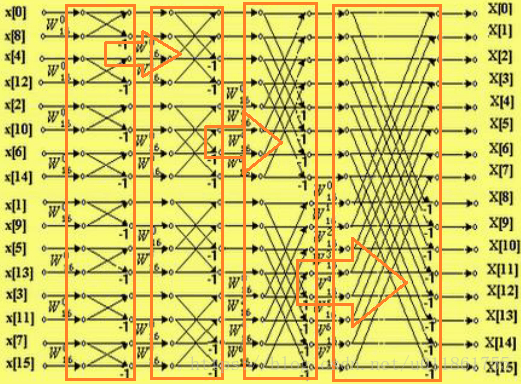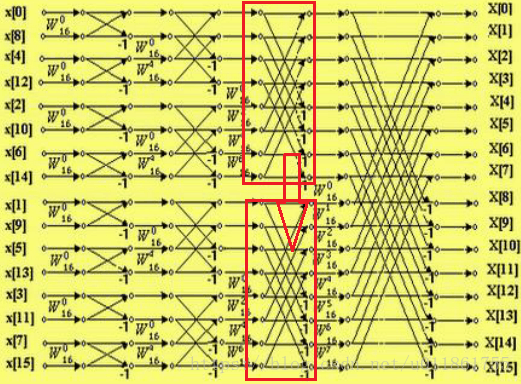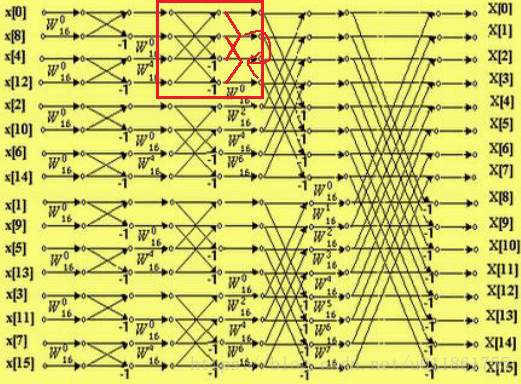介绍
网络上的原理介绍非常丰富,具体请自行搜索网络资源。
本算法依靠FFT流图进行布置。
算法 ##
进行完所有的原理推导后,我们可以得到如下的16点FFT流图:
通过上图可以看出整个流图输入序列的顺序已经被颠倒,这实际上是输入序列中元素的序号进行了比特位的逆序排列,即其二进制比特位发生了镜像,例如001变为了100。另外一共有三个镶嵌的循环。
为了实现输入序列的比特逆序排列,要使用雷德算法进行实现。
下面进行FFT算法的核心讲解:

第一层循环: 
第二层循环:

第三层循环:

每一次循环中的蝴蝶运算操作请参阅网络资源。
FFT和IFFT的结果与DFT和IDFT的结果有一定的偏差,且由于计算机计算的精度关系,反变换结果与原始输入序列不一定完全相同。
下面给出代码:
#include <iostream> #include <cmath> #include <iomanip> using namespace std; double PI = 3.1415926535897933; //定义复数结构体 typedef struct complex_number { double real; double imagine; }complex_number; //定义旋转因子 complex_number omega_num(int k, int n, int input_length); complex_number omega_num(int k, int n, int input_length) { //k是傅里叶变换结果的序号 //n是求解DFT时的序号 //input_length是输入序列的长度 complex_number omega_num; omega_num.real = cos(-2 * PI * k * n / input_length); omega_num.imagine = sin(-2 * PI * k * n / input_length); return omega_num; } //定义复数乘法的函数 complex_number complex_multiply(complex_number a, complex_number b); complex_number complex_multiply(complex_number a, complex_number b) { complex_number result; result.real = a.real*b.real - a.imagine*b.imagine; result.imagine = a.real*b.imagine + a.imagine*b.real; return result; } void main() { //FFT - 快速傅里叶变换! //初始化 - 常量、变量的定义。 const int input_length = 4;//输入数组的长度 double input[input_length] = { 1,2,3,4 }; //将输入数组进行比特倒位排列 - 雷德算法 for (int j = 0, i = 0; i < input_length - 1; i++)//这里实现了奇偶前后分开排序 { int k; if (i < j)//如果i<j,即进行变址 { double temp; temp = input[j]; input[j] = input[i]; input[i] = temp; } k = input_length / 2;//求j的下一个倒位序 while (j >= k)//如果k<=j,表示j的最高位为1 { j = j - k;//把最高位变成0 k = k / 2;//k/2,比较次高位,依次类推,逐个比较,直到某个位为0 } j = j + k; } ////显示比特逆排序的结果 //比特逆序数结束后,原输入序列已经发生改变~~~,如果要用原始DFT公式进行FFT的验算,则需要将原始输入序列重新定义。 //核心部分:FFT迭代------------------------------------------------------------------- int EachLayer_length;//蝶形运算数量。每执行一次外循环时,每个区域的蝶形运算器的数量的2倍 complex_number FFT_Output[input_length]; //由于最底层的输入是实数,而输出也是实数,所以单独拿出来进行循环 //最底层 for (int a = 0; a < input_length; a += 2) { double temp; temp = input[a]; input[a] = input[a] + input[a + 1];//注意这一步完成以后input[a]的值将改变,必须将原始input[a]的值放在临时变量中保存。 input[a + 1] = temp - input[a + 1]; } //显示最底层的计算结果 //for (int i = 0; i < input_length; i++) //{ // cout << input[i] << endl; //} //将最底层计算出的结果全部赋值给FFT输出变量,即FFT_Output for (int b = 0; b < input_length; b++) { FFT_Output[b].real = input[b]; FFT_Output[b].imagine = 0; } //从倒数第二层开始循环,保证所有的输入与输出都是复数 for (int s = 2; s <= log(input_length) / log(2); s++) { EachLayer_length = (int)pow(2, s);//每一次最外层循环时,每层的蝶形运算数量,是蝶形运算器数量的2倍。 for (int m = 0; m < input_length; m = m + EachLayer_length) { for (int n = 0; n < EachLayer_length / 2; n++) { complex_number temp;//定义临时复数变量。 //蝶形运算 temp.real = FFT_Output[m + n].real; temp.imagine = FFT_Output[m + n].imagine; FFT_Output[m + n].real = FFT_Output[m + n].real + complex_multiply(FFT_Output[m + n + EachLayer_length / 2], omega_num(1, n*input_length/(1 << s), input_length)).real; FFT_Output[m + n].imagine = FFT_Output[m + n].imagine + complex_multiply(FFT_Output[m + n + EachLayer_length / 2], omega_num(1, n*input_length / (1 << s), input_length)).imagine; FFT_Output[m + n + EachLayer_length / 2].real = temp.real - complex_multiply(FFT_Output[m + n + EachLayer_length / 2], omega_num(1, n*input_length / (1 << s), input_length)).real; FFT_Output[m + n + EachLayer_length / 2].imagine = temp.imagine - complex_multiply(FFT_Output[m + n + EachLayer_length / 2], omega_num(1, n*input_length / (1 << s), input_length)).imagine; } } } EachLayer_length = 0;//为后面的IFFT使用而将该变量置零。 cout << "FFT变换结果为:\n"; for (int q = 0; q < input_length; q++) { if (FFT_Output[q].imagine < 0) cout << FFT_Output[q].real << FFT_Output[q].imagine << "i" << endl; else if (FFT_Output[q].imagine == 0) cout << FFT_Output[q].real << endl; else cout << FFT_Output[q].real << "+" << FFT_Output[q].imagine << "i" << endl; } cout << endl; //IFFT - 快速傅里叶逆变换!具体的循环原理请参照IFFT流图。 //直接将FFT的输出结果作为输入,输入到FFT算法中,输出结果的实部就是IFFT的实序列。 //定义需要使用的变量 complex_number IFFT_Input[input_length];//IFFT的输入序列 complex_number IFFT_Output[input_length];//IFFT的输出序列 //将上文中FFT的计算结果全部赋给IFFT_Input,并对IFFT_Input的虚部取共轭; for (int a = 0; a < input_length; a++) { IFFT_Input[a].real = FFT_Output[a].real; IFFT_Input[a].imagine = -FFT_Output[a].imagine; } //对输入的复数序列进行比特逆序排序 - 雷德算法 //首先对输入序列的实数部分进行排序 for (int j = 0, i = 0; i < input_length - 1; i++) { int k; if (i < j) { complex_number temp; temp = IFFT_Input[j]; IFFT_Input[j] = IFFT_Input[i]; IFFT_Input[i] = temp; } k = input_length / 2; while (j >= k) { j = j - k; k = k / 2; } j = j + k; } //核心部分:IFFT迭代,与FFT迭代一模一样------------------------------------------------- //从倒数第一层开始循环 for (int s = 1; s <= log(input_length) / log(2); s++) { EachLayer_length = (int)pow(2, s);//每一次最外层循环时,每层的蝶形运算数量,是蝶形运算器数量的2倍。 for (int m = 0; m < input_length; m = m + EachLayer_length) { for (int n = 0; n < EachLayer_length / 2; n++) { complex_number temp;//定义临时复数变量。 //蝶形运算 temp.real = IFFT_Input[m + n].real; temp.imagine = IFFT_Input[m + n].imagine; IFFT_Input[m + n].real = IFFT_Input[m + n].real + complex_multiply(IFFT_Input[m + n + EachLayer_length / 2], omega_num(1, n*input_length / (1 << s), input_length)).real; IFFT_Input[m + n].imagine = IFFT_Input[m + n].imagine + complex_multiply(IFFT_Input[m + n + EachLayer_length / 2], omega_num(1, n*input_length / (1 << s), input_length)).imagine; IFFT_Input[m + n + EachLayer_length / 2].real = temp.real - complex_multiply(IFFT_Input[m + n + EachLayer_length / 2], omega_num(1, n*input_length / (1 << s), input_length)).real; IFFT_Input[m + n + EachLayer_length / 2].imagine = temp.imagine - complex_multiply(IFFT_Input[m + n + EachLayer_length / 2], omega_num(1, n*input_length / (1 << s), input_length)).imagine; } } } //将计算完成的结果赋给输出序列IFFT_Output并显示结果 cout << "IFFT结果:\n"; for (int c = 0; c < input_length; c++) { IFFT_Output[c].real = IFFT_Input[c].real / input_length; cout << IFFT_Output[c].real << endl; } cout << endl; //应用原始DFT公式对FFT算法进行验算 const int input_length1 = 4; double input1[input_length1] = { 1,2,3,4 }; complex_number DFT_sum, DFT_Output[input_length1]; for (int k = 0; k < input_length1; k++) { DFT_sum.real = DFT_sum.imagine = 0; for (int n = 0; n < input_length1; n++) { DFT_sum.real += input1[n] * omega_num(k, n, input_length1).real; DFT_sum.imagine += input1[n] * omega_num(k, n, input_length1).imagine; } DFT_Output[k].real = DFT_sum.real; DFT_Output[k].imagine = DFT_sum.imagine; } cout << "DFT变换结果为:\n"; for (int q = 0; q < input_length1; q++) { if (DFT_Output[q].imagine < 0) cout << DFT_Output[q].real << DFT_Output[q].imagine << "i" << endl; else if (DFT_Output[q].imagine == 0) cout << DFT_Output[q].real << endl; else cout << DFT_Output[q].real << "+" << DFT_Output[q].imagine << "i" << endl; } cout << endl; //下面进行IDFT double output_IDFT[input_length1], IDFT_sum; for (int n = 0; n < input_length1; n++) { IDFT_sum = 0; for (int k = 0; k < input_length1; k++) { //这里一定注意复数与复数相乘的法则,不仅要将实数部分相乘,由于i*i=-1,所以还要减去虚数部分相乘的结果! IDFT_sum += DFT_Output[k].real*omega_num(k, -n, input_length1).real - DFT_Output[k].imagine*omega_num(k, -n, input_length1).imagine; } output_IDFT[n] = IDFT_sum / input_length1; } cout << "IDFT变换结果为:\n"; for (int q = 0; q < input_length1; q++) cout << output_IDFT[q] << endl; cout << endl; }
---------------------
作者:WilliamS1995
来源:CSDN
原文:https://blog.csdn.net/u011861755/article/details/82666649
版权声明:本文为博主原创文章,转载请附上博文链接!


